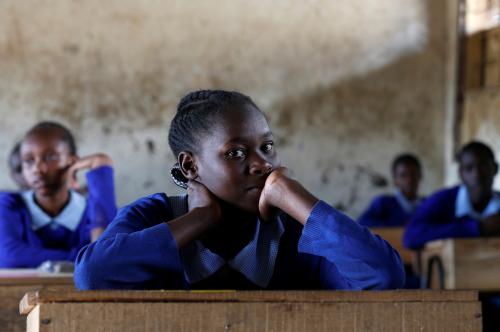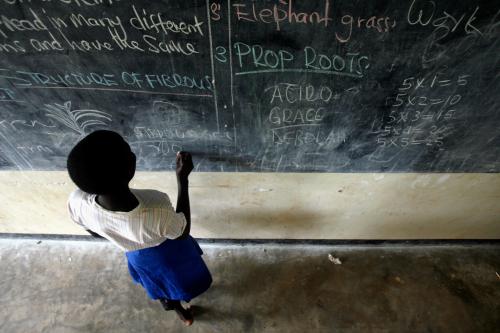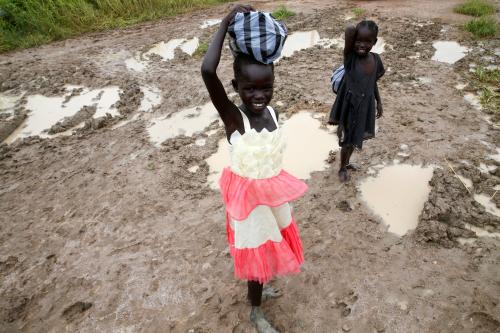Sarah’s path after graduation looks quite different from many of her classmates’ in Jinja, Uganda. Although still in her early 20s, she is a budding young entrepreneur, running two businesses while supporting her family and saving for university. Why—when many of her peers fall into youth unemployment after school—was Sarah’s trajectory different?
The answer to this question isn’t just important for Sarah and her schoolmates, it’s a broad policy issue. Africa is the world’s youngest continent, with nearly half of its population under 18. By 2045, this demographic is expected to more than double. And by the end of the century, nearly 50 percent of the world’s children will live in Africa.
These demographics present both an enormous challenge and an incredible opportunity. Equipped with the right tools, Africa’s growing youth population has the potential to drive positive change and transform the continent’s future. To capitalize fully on this opportunity, policymakers and educators must actively seek solutions that help young women develop the tools to succeed, as girls often face additional barriers that result in lower levels of education, higher unemployment, and rigid social restrictions that perpetuate a lack of opportunity and further limit potential.
But how can we effectively equip youth with the skills to thrive in the 21st century? Educate! is a nonprofit social enterprise working to prepare youth, like Sarah, with the skills to succeed in today’s economy. Our experiential model of education teaches the transferable and soft skills demanded most by both employers and students, such as teamwork, public speaking, networking, critical thinking, self-confidence, and creativity. On top of those foundational soft skills, our curriculum also layers hard business skills.
Beginning in 2012, Educate! partnered with researchers from the University of California-Berkeley and the World Bank, and Innovations for Poverty Action to conduct a randomized controlled trial (RCT) to measure the impact of our flagship model in Uganda on program graduates four years after completion. From what we have found, this is the first study in Africa that demonstrates a causal link between a school-based soft-skill development program and improvements in life outcomes related to education and gender equity.
 Credit: Educate!
Credit: Educate!
The evaluation found that the Educate! program achieved lasting, statistically significant impacts on participating youths’ soft skills. In the four years since the program, youth have translated these skill improvements into improved life outcomes in key areas, such as gender-related outcomes and educational attainment. These results were encouraging and have exciting policy implications, as a growing body of research suggests that soft skills play a critical role in driving positive, long-term life outcomes. For young women in the program, the impact was even more pronounced, and the RCT provided important insights into how programs that target soft skills can also support young women in navigating life in the 21st century and its subsequent challenges. Based on these findings, Educate! drew a few critical conclusions.
Building soft skills can encourage youth, particularly girls, to further invest in education
Equipped with improved soft skills to navigate life’s decisions, Educate! participants propelled themselves further within their studies. The program had a statistically significant impact on secondary education completion. For young women, the impact was even greater. Moreover, the increase in likelihood of completing secondary school for young women who participated in the Educate! program was enough to virtually close the gender gap—graduation rates were 89.9 percent for women in the treatment group (compared to 83.3 percent for women in the comparison group) and 90.4 percent for men in the comparison group. Additionally, women in the treatment group were also more likely to enroll in universities or vocational schools. The program also influenced their choice of study, and female Educate! graduates were more likely to pursue technical degrees, like business and STEM majors, in university.
This research suggests that when youth, especially young women, improve skills that help them set and achieve their personal goals, they invest in themselves and their future, particularly through education. For young people in Africa, this is a logical investment, as further education will not only shape their labor market prospects but earn them sizable returns in the long term. According to a World Bank study, those who graduate from secondary school in Uganda earn 16.7 percent more than peers who complete primary alone, and those who complete tertiary earn an average of 23.4 percent more than those who finish only secondary. The returns are even higher for young women.
Soft skill development programs can also drive important life outcomes related to gender equity
Improved soft skills provide young people with a toolbox of flexible skills that can assist them in charting the course for their future and making informed decisions aligned with their goals. These skills are useful across every facet of life, including the workplace, within personal and family relationships, in school, and more. The findings of this RCT suggest that youth are leveraging the multidimensional skills gained through the Educate! program to positively influence critical life outcomes related to gender equity. The evaluation found strong and positive impacts on outcomes the researchers termed “social spillovers” for both girls and boys: reducing domestic violence, sexual partners, and number of children, and improving egalitarian views. Particularly encouraging within these results? The effects demonstrated by the evaluation are broadly comparable to some interventions that specifically target gender-related outcomes.
While the Educate! program seemed to improve girls’ ability to exercise agency within their lives, it also promoted gender equity in another key way: shifting young men’s views about the role and potential of young women. After participating in Educate!, boys expressed values and beliefs that suggest they see female peers more as equals and could help challenge some of the stereotypes that hold girls back. Male graduates were more likely to recognize women’s value and roles in society and the right to safe and consensual sex, and to engage in less risky sexual behavior. While more research is needed, these findings suggest that the Educate! program could further support young women to achieve their goals by shifting young men’s attitudes—bringing them closer to being allies in the fight for gender equity rather than adversaries.
This RCT contributes to the growing literature demonstrating the critical role soft skill development plays in helping young women act as decisionmakers in their lives and to set and achieve their own goals.
But did the program show any impacts on graduates’ employment outcomes? With many youth still in university and vocational school, it is too soon to tell. What we do know is that the impacts from Educate!’s program on skills, gender, and educational outcomes have promising implications for the future. Existing research shows that improvements in these outcomes strongly correlate with long-term labor market outcomes. While these economic impacts may need more time to materialize, the medium-term impacts suggest that youth are receiving the skills they need to improve life outcomes.
Leveraging the essential soft skills learned through the Educate! program, youth are charting a new path for themselves. Sarah launched her first enterprise and used the income to cover her school fees, enabling her to graduate secondary school and support her family. Despite her young age, the experience and skills she’s gained help her face the future confidently. “I’m the one taking care of most of my family members. It makes me happy because it means I’m responsible. If anything comes up in the future, I’m ready to deal with it.”
As implementers working within the education to employment space, we must embrace evidence that developing adolescents’ soft skills can yield positive outcomes that seep into many aspects of young people’s lives. We must collectively examine how education can set youth up for success—not just in the classroom and on exams but in life after school. The results from this RCT suggest that by focusing our efforts on redefining education systems to prepare youth with important soft skills, we can develop an empowered generation of male and female learners who are equal partners in driving positive change and begin to dismantle the societal barriers that hold girls back. By equipping this growing working-age population with the essential skills to thrive in the 21st century, we can leverage Africa’s greatest resource for change—young people—and prepare them with the skills to drive equitable and inclusive development across the continent.






Commentary
How skills shape the trajectory of life after school in Uganda
Lessons from a youth skills evaluation
March 2, 2020